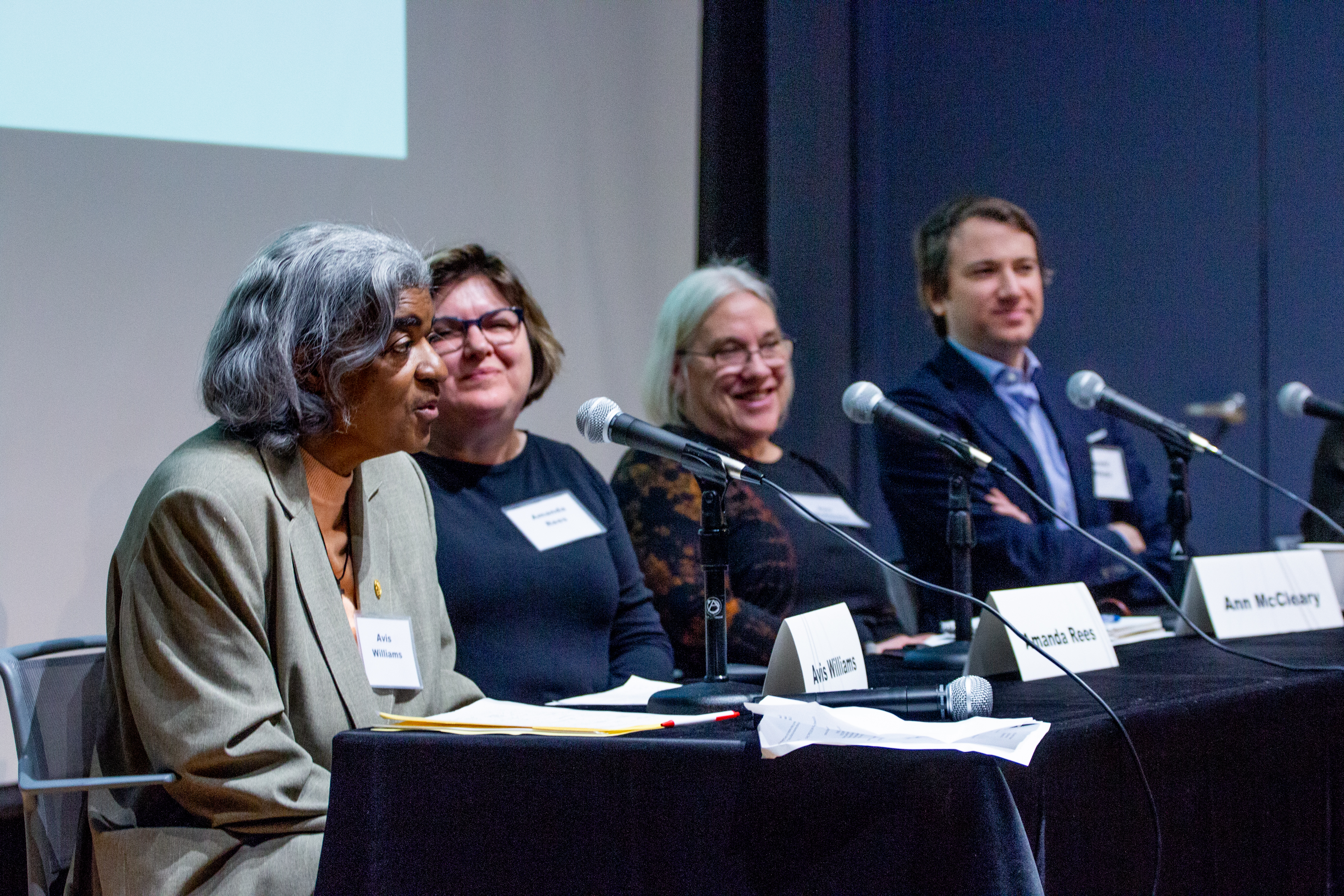VIDEO: Georgia Humanities Symposium brought value and inspiration to diverse participants

The Willson Center received a three-year, $500,000 grant from The Andrew W. Mellon Foundation in 2018 for the expansion of its Global Georgia Initiative, a public humanities program in place since 2013. One of the core developments that followed was the creation of an annual symposium to amplify and share ideas for engaged humanities research from a diverse community of academic leaders.
The first Georgia Humanities Symposium was held on Friday, March 8, 2019 in the Georgia Museum of Art on the UGA campus, in partnership with Georgia Humanities. The symposium’s three panel discussions included participants from state, regional, and national institutions including Georgia Tech, Morehouse College, the University of North Carolina, the National Humanities Alliance, the Consortium of Humanities Centers and Institutes, and the High Museum of Art. Videos of the panels are posted below.
The symposium was illustrative of a movement toward strengthening connections among humanities institutions nationally, and sharing strategies for involving local communities as partners in resource building and research.
Humanities Indicators, a project of the American Academy of Arts and Sciences, has recently published its National Inventory of Humanities Organizations, a database encompassing more than 45,000 “not-for-profit, for-profit, and government institutions engaged in humanities scholarship and/or in bringing humanities knowledge or skills to various audiences.” And the NHA’s Humanities for All website catalogs more than 1,400 publicly engaged humanities initiatives nationwide and more than 40 in Georgia, including several that were represented at the symposium.
One of those is the Columbus Community Geography Center at Columbus State University, coordinated by Amanda Rees, who participated in the panel on “Georgia and the Public Humanities.”
Rees and student researchers in the center use academic resources and methods in collaboration with community members on projects such as a historical map to help develop a historic district nomination for a formerly segregated, post-World War II African American subdivision in Columbus. “When we can use our tools to help tell that story, that’s really pretty important,” she said during the panel. “To help people understand what they’re looking at, and not just see it in one way.”
Mark Wilson, director of Auburn University’s Caroline Marshall Draughon Center for the Arts and Humanities, was one of the more than 80 humanities research leaders who attended the symposium. “I was challenged to think about our community relationships and partnerships in a new way,” he said, “and I believe this gathering made a contribution to everyone who attended.”
“Every project that was shared in Athens expands the number and range of people who have experienced and benefitted from the humanities,” wrote Daniel Fisher, a project director at the National Humanities Alliance Foundation, in a blog post on the NHA’s website.
Vicki L. Crawford, director of the Martin Luther King, Jr. Collection and associate professor of African American Studies at Morehouse College, served as moderator on the symposium’s third panel on next steps for public humanities initiatives in Georgia. “As we face the challenges of our times, the humanities will continue to play a central role in American life and culture,” she said. “Our recent gathering was especially enriching and certain to generate new collaborations and partnerships among a diverse array of humanities educators and advocates throughout the state.”
The Willson Center is currently planning the 2020 Georgia Humanities Symposium, which will be held next spring.
Introductions
Nicholas Allen (Director, Willson Center) and Libby Morris (Interim Senior Vice President for Academic Affairs and Provost, UGA)
Panel One: Georgia and The Public Humanities
Chair: Stephen Berry (UGA)
Edward Hatfield (New Georgia Encyclopedia)
Ann McCleary (University of West Georgia, West Georgia Textile Heritage Trail)
Amanda Rees (Columbus State)
Avis Williams (Putnam County School System)
Panel Two: Making Connections
Chair: William Warner (CHCI)
Rand Suffolk (High Museum)
Jeanne Bohannon (Kennesaw University)
Robyn Schroeder (UNC)
Brian Orland (UGA)
Panel Three: Next Steps
Chair: Vicki Crawford (Morehouse)
Kelly Caudle (Georgia Humanities)
Jacqueline Jones Royster (Georgia Tech)
Barbara McCaskill (UGA)
Daniel Fisher (NHA)
Closing Remarks
Nicholas Allen (Director, Willson Center)
